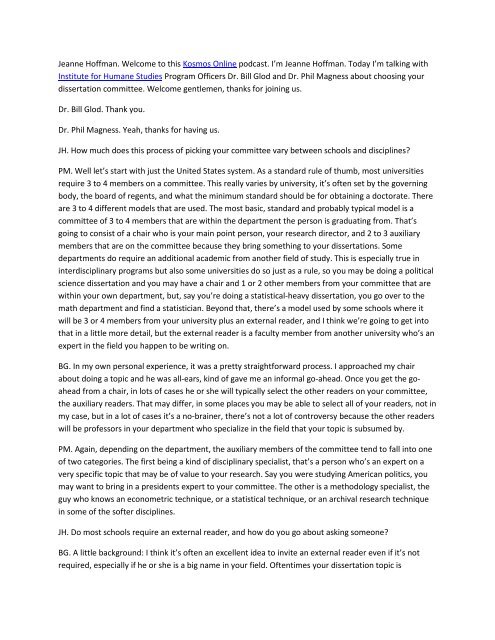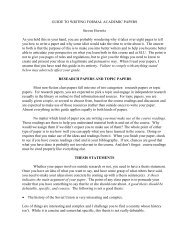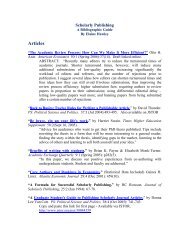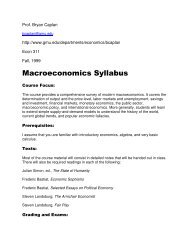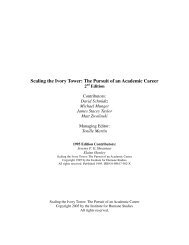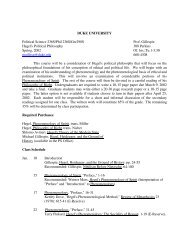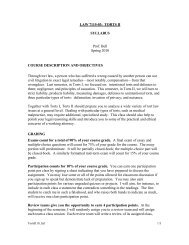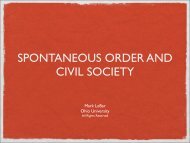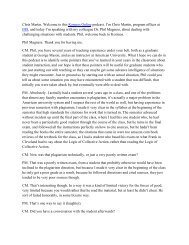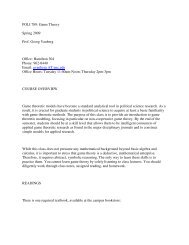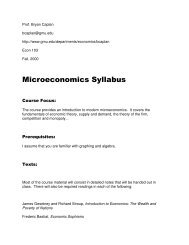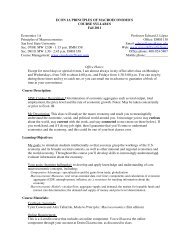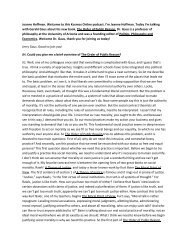Jeanne Hoffman. Welcome to this Kosmos Online podcast. I'm ...
Jeanne Hoffman. Welcome to this Kosmos Online podcast. I'm ...
Jeanne Hoffman. Welcome to this Kosmos Online podcast. I'm ...
Create successful ePaper yourself
Turn your PDF publications into a flip-book with our unique Google optimized e-Paper software.
<strong>Jeanne</strong> <strong>Hoffman</strong>. <strong>Welcome</strong> <strong>to</strong> <strong>this</strong> <strong>Kosmos</strong> <strong>Online</strong> <strong>podcast</strong>. I’m <strong>Jeanne</strong> <strong>Hoffman</strong>. Today I’m talking with<br />
Institute for Humane Studies Program Officers Dr. Bill Glod and Dr. Phil Magness about choosing your<br />
dissertation committee. <strong>Welcome</strong> gentlemen, thanks for joining us.<br />
Dr. Bill Glod. Thank you.<br />
Dr. Phil Magness. Yeah, thanks for having us.<br />
JH. How much does <strong>this</strong> process of picking your committee vary between schools and disciplines?<br />
PM. Well let’s start with just the United States system. As a standard rule of thumb, most universities<br />
require 3 <strong>to</strong> 4 members on a committee. This really varies by university, it’s often set by the governing<br />
body, the board of regents, and what the minimum standard should be for obtaining a doc<strong>to</strong>rate. There<br />
are 3 <strong>to</strong> 4 different models that are used. The most basic, standard and probably typical model is a<br />
committee of 3 <strong>to</strong> 4 members that are within the department the person is graduating from. That’s<br />
going <strong>to</strong> consist of a chair who is your main point person, your research direc<strong>to</strong>r, and 2 <strong>to</strong> 3 auxiliary<br />
members that are on the committee because they bring something <strong>to</strong> your dissertations. Some<br />
departments do require an additional academic from another field of study. This is especially true in<br />
interdisciplinary programs but also some universities do so just as a rule, so you may be doing a political<br />
science dissertation and you may have a chair and 1 or 2 other members from your committee that are<br />
within your own department, but, say you’re doing a statistical-heavy dissertation, you go over <strong>to</strong> the<br />
math department and find a statistician. Beyond that, there’s a model used by some schools where it<br />
will be 3 or 4 members from your university plus an external reader, and I think we’re going <strong>to</strong> get in<strong>to</strong><br />
that in a little more detail, but the external reader is a faculty member from another university who’s an<br />
expert in the field you happen <strong>to</strong> be writing on.<br />
BG. In my own personal experience, it was a pretty straightforward process. I approached my chair<br />
about doing a <strong>to</strong>pic and he was all-ears, kind of gave me an informal go-ahead. Once you get the goahead<br />
from a chair, in lots of cases he or she will typically select the other readers on your committee,<br />
the auxiliary readers. That may differ, in some places you may be able <strong>to</strong> select all of your readers, not in<br />
my case, but in a lot of cases it’s a no-brainer, there’s not a lot of controversy because the other readers<br />
will be professors in your department who specialize in the field that your <strong>to</strong>pic is subsumed by.<br />
PM. Again, depending on the department, the auxiliary members of the committee tend <strong>to</strong> fall in<strong>to</strong> one<br />
of two categories. The first being a kind of disciplinary specialist, that’s a person who’s an expert on a<br />
very specific <strong>to</strong>pic that may be of value <strong>to</strong> your research. Say you were studying American politics, you<br />
may want <strong>to</strong> bring in a presidents expert <strong>to</strong> your committee. The other is a methodology specialist, the<br />
guy who knows an econometric technique, or a statistical technique, or an archival research technique<br />
in some of the softer disciplines.<br />
JH. Do most schools require an external reader, and how do you go about asking someone?<br />
BG. A little background: I think it’s often an excellent idea <strong>to</strong> invite an external reader even if it’s not<br />
required, especially if he or she is a big name in your field. Oftentimes your dissertation <strong>to</strong>pic is
something you’ll end up knowing better than anything on your own committee, your own home<br />
department, so it’s good not <strong>to</strong> feel like you’re restricted <strong>to</strong> the knowledge of the people who happen <strong>to</strong><br />
be in your department. It’s good <strong>to</strong> cast your net wider and recruit external readers even when it’s not<br />
required, and if your committee’s okay with it I say go for it.<br />
PM. By all means, the external reader is a chance <strong>to</strong> add expertise, add prestige that you otherwise<br />
wouldn’t get in your own department. Maybe you know a specialist that is also doing research in your<br />
field, they could be an ideal candidate of someone <strong>to</strong> approach as an external reader. Another route <strong>to</strong><br />
go about finding one is <strong>to</strong> ask your committee chair. The committee chair should be at the high end of<br />
his or her discipline in his field and would know who the other experts are who bring some issue<br />
relevance or some research relevance <strong>to</strong> your dissertation, so you’re kind of getting your dissertation<br />
before another set of eyes outside of your own department. If your department has a reputation of<br />
maybe having a niche, maybe it’s very strong in Austrian economics but you want <strong>to</strong> see how the<br />
dissertation fares in departments that come from a different outlook on a <strong>to</strong>pic, that may be an<br />
opportunity <strong>to</strong> get that additional reader, that additional level of feedback that otherwise wouldn’t<br />
always be there in your own department.<br />
BG. When it comes <strong>to</strong> inviting external readers, of course I think it’s important <strong>to</strong> go through your<br />
advisor first, you don’t want <strong>to</strong> go over their head first of all [laughter], they’ll be like, “who’s <strong>this</strong> guy,”<br />
right, but your advisor may have good reasons for or against external readers in general or against<br />
bringing in a particular external person. Your chair often has local knowledge, counting in favor of a<br />
reader who you weren’t familiar with, or she may have knowledge of a particularly bad reader that<br />
looked good <strong>to</strong> you on paper, so do confer with your chair beforehand. Moreover, let your chair, unless<br />
you already have a good relationship with the external person, let the chair be the one <strong>to</strong> broach the<br />
<strong>to</strong>pic with the invitee, they will likely have more of a relationship with your chair as being a fellow senior<br />
professor, than with you, who’s a fairly novice grad student that they may not know. I think, all in all,<br />
well-respected external readers are a boon <strong>to</strong> your dissertation, not only in terms of what you can learn<br />
from them, but also as a signal on your CV of the caliber of people whose tutelage you were under. I<br />
know one philosopher who had three external readers in addition <strong>to</strong> three readers from his home<br />
department, and in addition these external readers had been engaged in a scholarly debate with his<br />
committee chair on some of the very <strong>to</strong>pics his dissertation covered, so that was a great dialectic for him<br />
<strong>to</strong> have.<br />
JH. You both sort of stressed the importance of talking <strong>to</strong> your chair and people in your department,<br />
what are some of the biggest mistakes you’ve seen students make in picking their chair?<br />
PM. I’d say not doing their research in advance, not figuring out what the style that particular chair is<br />
going <strong>to</strong> bring <strong>to</strong> the committee, different chairs have different expectations of their students, some<br />
chairs are very hands-on and want <strong>to</strong> see dissertation chapters turned out on that schedule and<br />
reviewed on that schedule before heading on <strong>to</strong> the next stage of research. Others are looking for more<br />
of a big picture, you deliver a finished product, they send their comments on the whole thing back <strong>to</strong><br />
you and you make your revisions. Chairs also differ in the amount of time they want <strong>to</strong> invest in a<br />
particular student, and as a graduate student that’s pursuing a Ph.D., you want <strong>to</strong> find a chair who takes
your research seriously, that takes an interest in your <strong>to</strong>pic. That makes it a lot easier <strong>to</strong> communicate<br />
with that person, it avoids a lot of the pitfalls of falling in<strong>to</strong> the neglect trap. Falling in<strong>to</strong> a situation<br />
where you aren’t getting feedback in a timely manner, a lot of that’s just accomplished by deciding who<br />
you want <strong>to</strong> work with in the first two-<strong>to</strong>-three years of grad school, in your coursework.<br />
BG. I agree with all that. I think one of the mistakes people make is asking their chair at the last minute,<br />
without first establishing a men<strong>to</strong>ring relationship with <strong>this</strong> person. I’ve said <strong>this</strong> elsewhere: it’s really<br />
important that you develop a men<strong>to</strong>ring relationship with a faculty member from day one, early in your<br />
career stage. Very often that person will end up being your committee chair if their research interests<br />
are congruent with yours, but you don’t want <strong>to</strong> launch in<strong>to</strong> the dissertation stage unfamiliar with the<br />
person who will basically be your head coach for the next couple of years. I think another mistake<br />
people make, Phil went in<strong>to</strong> <strong>this</strong> some, they treat their dissertation as just another grad school<br />
assignment. Your advisor is there <strong>to</strong> frame your dissertation, <strong>to</strong> comment on your papers and chapter,<br />
but he or she may vary quite a bit in the level of oversight they bring, so either way you need <strong>to</strong> take<br />
charge. The chair, it is not their responsibility, and it shouldn’t be a presumption on your part that<br />
they’re there <strong>to</strong> give you all the structure, you have <strong>to</strong> set your own deadlines. On a related point, you<br />
don’t just want a nice chair, who will tell you what you want <strong>to</strong> hear and will make the whole<br />
dissertation <strong>to</strong>pic smooth and easy. It may not be fun at the time, but you want a chair who doesn’t pull<br />
punches, who will be willing <strong>to</strong> give you the occasional scathing critique of what you’ve written because<br />
that will make you a better scholar. Finally, I think a lot of people neglect <strong>to</strong> pay attention <strong>to</strong> the<br />
placement record of different faculty members of their department. If you are looking for a chair <strong>this</strong><br />
knowledge should be available through your department, but it’s also qualitative knowledge available<br />
through other, more senior graduate students in your program. “What is <strong>this</strong> chair like <strong>to</strong> work with,<br />
what success have they had, what’s their track record in terms of placing their former students in jobs?”<br />
If it’s someone who’s never had graduate students before or never been able <strong>to</strong> really place them well,<br />
that should give you serious pause in considering <strong>this</strong> person as your chair.<br />
JH. What other advice would you gentlemen give current students <strong>to</strong> avoid common pitfalls?<br />
PM. It kind of goes back <strong>to</strong> what I said earlier, use your first two or three years of graduate school <strong>to</strong> do<br />
your research. When you are sitting in the classroom, you are taking in the teaching style, the research<br />
style of the department before you. At the same time, know that the faculty there are watching the<br />
students. If you take yourself seriously, produce high-quality research for your coursework, that is a<br />
signal that, “Hey, <strong>this</strong> is a student I want <strong>to</strong> work with. This is a somebody that I would be willing <strong>to</strong><br />
serve on his or her committee.” Take your courses seriously, use that as an opportunity <strong>to</strong> kind of<br />
familiarize yourself with your department and the different offerings it has.<br />
BG. Sometimes a particular course paper will be the seed for a dissertation. I would like <strong>to</strong> mention<br />
briefly about the prospectus, the sort of pro<strong>to</strong>-dissertation. The prospectus is what you defend as sort of<br />
a proposal, an outline of what your dissertation will be, usually takes a draft or two, where you outline<br />
your intended dissertation. Then, you meet with your committee <strong>to</strong> defend the prospectus. Usually<br />
they’ll pass it, sometimes they’ll require some revisions here or there. At the prospectus defense, you’ll<br />
probably be <strong>to</strong>ld lots of things you need <strong>to</strong> do differently that you weren’t really aware of going on. That
may feel a little bit overwhelming, but it’s ultimately for the best. They’ve been through <strong>this</strong>, they’re<br />
specialists in knowing how <strong>to</strong> write good dissertations. Nonetheless, you’ll probably be surprised that<br />
the finished dissertation will look much different than the outline you had going in<strong>to</strong> the prospectus<br />
defense.<br />
JH. Well thank you both Dr. Magness and Dr. Glod for joining us.<br />
BG. Thank you.<br />
PM. Thank you.<br />
JH. And for more career advice, visit kosmosonline.org. Connecting the network of liberty-advancing<br />
academics, and <strong>this</strong> is <strong>Jeanne</strong> <strong>Hoffman</strong> signing off.


